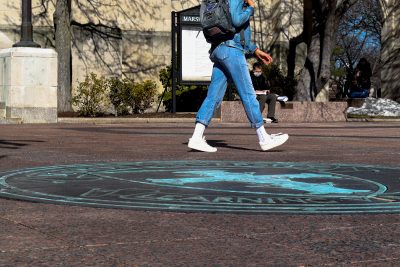
Despite an uptick in Ph.D. applications for the Fall semester, some Boston University departments will be accepting fewer students due to budget cuts.
Daniel Star, an associate professor of philosophy, tweeted that there is an intentional decrease in admitted Ph.D. students in the philosophy department from six to four for the upcoming year.
“This year the goal is to admit 4 (although we offer more spots at the start), because of budget cuts,” he wrote. “That is 1.58% of our applicants, compared to 3.26% last year.”
Star said the increase in philosophy applications, and most likely other studies as well, is not unique to BU — it’s happening at other universities as well. He said one explanation may be the desire to escape the job market.
“We’re at a point where people are having trouble getting jobs,” Star said. “If you get accepted into a Ph.D. program, you have funding for five years and you can take a break from the job market and you can try to pursue a different kind of goal.”
He said the decrease in admissions was motivated by the University’s financial concerns.
“I’m not the expert, but clearly the University is cutting the budget,” Star said, “and they have to worry about their money and so they want to accept fewer students, but it’s not just BU.”
Associate Dean of the Graduate School of Arts and Sciences Malika Jeffries-EL said times of economic uncertainty often lead to an increase in Ph.D. applicants.
“When the labor market is tenuous, you see an uptick in graduate admissions,” Jeffries-EL said.
She noted past periods of economic hardships when graduate applications increased in response to financial turmoil.
“With markets down, it’s absolutely like 2008 when the financial crisis hit, graduate admissions went up,” Jeffries-EL said. “2016 when President Trump took the office and people were like ‘I don’t even know what this means,’ so what’s going to happen, graduate admissions went up.”
Jeffries-EL added that due to the fixed budget, programs cannot increase the number of students admitted, even if the number of applicants increases.
“It’s a budgetary decision,” she said. “You can’t expand just because the pool expands.”
The Chronicle of Higher Education keeps a running list of suspended doctoral programs, and as more programs started being put on pause, Jeffries-EL said students started contacting her department.
“I was getting emails, my office was getting emails,” she said, “various departments getting emails, ‘Oh my god are you taking students? Are you taking students?’”
However, Jeffries-EL said BU is not the only university scaling back its doctoral programs due to COVID-19. She cited The University of Pennsylvania having to close its equivalent to BU’s Graduate Research School for the 2021-22 academic year.
“I’m just glad that we didn’t have to go to that extreme of doing that,” Jeffries-EL said, “but at the same time, common sense says scale back.”
While BU did not have to close the whole school, the departments of English, Sociology and American and New England studies were “paused” for one year, Jeffries-EL said.
“Our decision to pause admission was an investment in our own people,” she said. “It’s negligent to bring in more people and not think about the financial implications on your current, so we cut admissions to help redirect funds to support existing students.”
Sonia Hofkosh, director of graduate studies in the Tufts University English Department, wrote in an email applications are up 40 percent across all Tufts Graduate programs this year.
She noted the increase was particularly substantial in terms of applicants for the English Department.
“We had considerably more than that percentage increase of applications for our PhD program over last year,” Hofkosh wrote.
Though she is unsure of the exact reason for increased applications, Hofkosh cited several possible explanations, including fewer programs accepting students, the removal of GRE and subject testing requirements, as well as the appeal of a fully funded graduate program in an uncertain job market.
“Our program is quite small,” Hofkosh wrote, “so it has been necessary for us and painful to turn away so many very strong, promising applicants.”
Jeffries-EL noted the cuts in admissions seemed more excessive due to comparisons between graduate and undergraduate programs, despite their difference in size.
“If we cut undergrads by 20 percent or 25 percent, that’d be 1,000 students and it’s like, ‘Oh my god,’” Jeffries-EL said, “but grad admissions are small, and so we’re talking about one or two people each program.”
However, while BU is seeing an uptick in Ph.D, applicants, master’s applicants are decreasing, Jeffries-EL said. She said this is due to the fact that a large pool of master’s applicants are usually international students.
“If you’re a brand new student,” she said, “you’re like, ‘I don’t want to pay money to study remotely. I want to pay money to live in the United States.’”
Currently, the future of the job market for graduates is uncertain, but Jeffries-EL said the school is working to address that issue.
“Lots of thoughtful conversations are going on at the graduate side of the house,” Jeffries-EL said.























































































































Shirley strulovic • Mar 4, 2021 at 10:09 am
Very simple explained an actual consequence of the the situation due to the pandemic.
An excellent tool on time to address answers and make an opportunity to increase the education. Maybe there are companies making good money which could divert money directly to education.